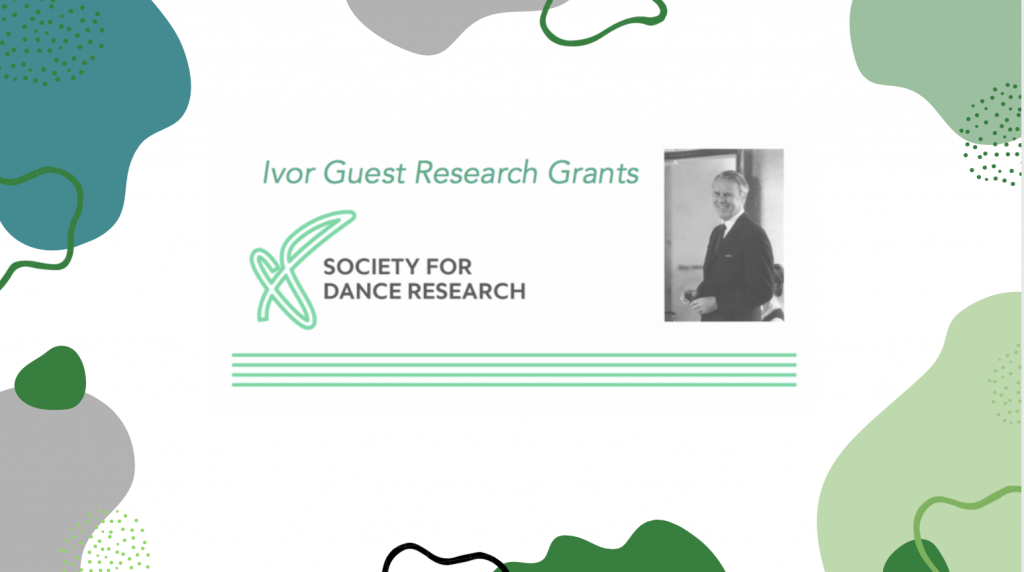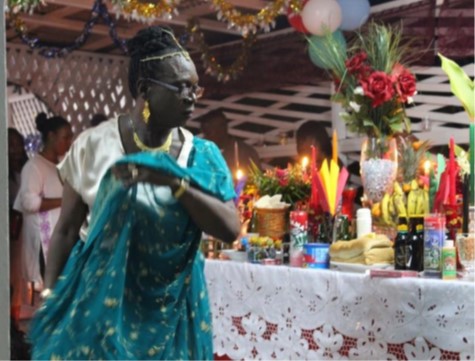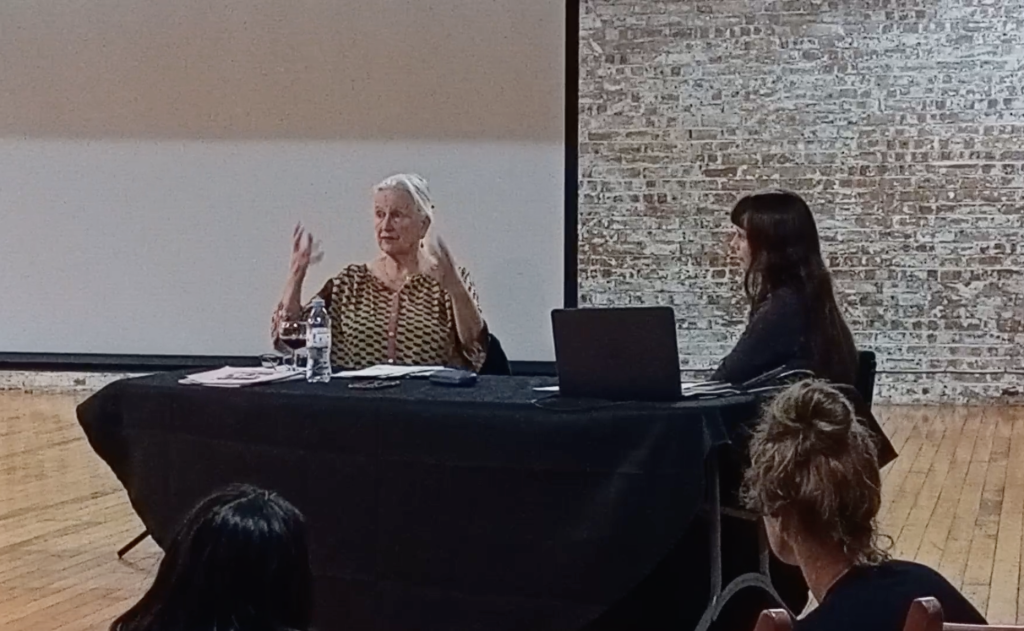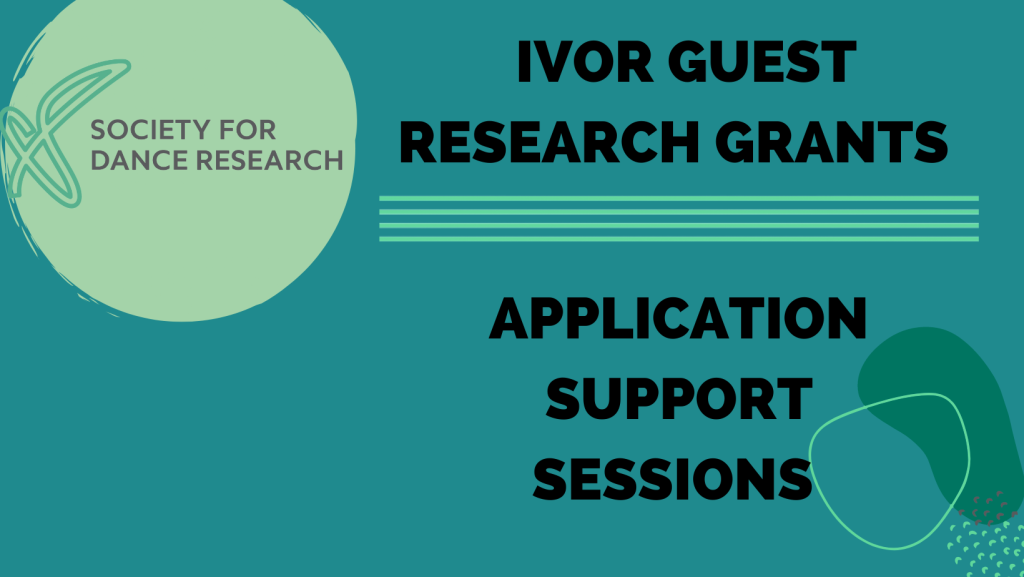
The Ivor Guest Research Grants
Following the expiration of our initial funding, 2023 saw a pause in the Ivor Guest Research Grants issued by the Society for Dance Research whilst we continue to resource more funding for the future and create an archive of the research that has already happened.
In the meantime, work continued for our 2022 grant recipients.
Claire Parfitt, Mapping Atlantic (Im)mobilities: Guyanese komfa communities

This project aimed to develop connections with communities in Guyana who practice komfa, a Black Atlantic religion that cultivates relationships with ancestors through dance, drumming, altar-making, offerings and spirit possession. It forms part of a longer-term project working with grassroots Caribbean dance communities in London, Guyana and the French Caribbean, developed with Dr Celena Monteiro.
The findings of the trip will feed into a bid for an AHRC Catalyst Award in 2024. In addition, Claire was able to develop a connection with the African-Guyanese novelist, activist and komfa practitioner Joan Cambridge which has grown into a collaboration responding to oil extraction in Guyana through komfa. An event is planned using komfa drumming and dance to summon the ancestors to join the living in a creative insurgency against corporate extractivism and environmental injustice. Collaborators in this project are currently Joan Cambridge, Dr Jeremy Peretz (UCLA), Dr Michelle Yaa Asantewa (UK), Dr Celena Monteiro (Kingston University) and Claire. Dr Monteiro and Claire presented early plans for this collaboration at the DSA Symposium ‘New mobilities “on the turn”?’ at The Place, London, on Friday 8th
September 2023.
Laura Smith, Salpêtrière’s Ball of Mad Women: 19th Century French Social Dance and the
Institutionalization of Gender and Disability
Support from the Society for Dance Research’s Ivor Guest Research Grant enabled Laura to
travel to London in April 2023 to conduct archival research at the Wellcome Collection. This
archival research project addressed the long-term research question: How did performance help
legitimize the emerging field of psychiatry at Hôpital Salpêtrière in the 19th century?
At the Wellcome Collection, Laura worked with medical reports, medical journals, letters, and
publications produced by Dr. Jean-Martin Charcot and his students at Salpêtrière. These
documents revealed that Charcot, who thought madness resided in the body rather than the mind,
was fascinated with the physical movements of hysterical attacks. He attempted to codify the
physical symptoms of hysteria into a movement language that could be used for diagnosis. As
part of legitimizing the emerging field of psychiatry, Charcot gave a lectures series at the hospital
in which he would demonstrate his theories and treatments for hysteria on patients in front of an
audience of medical professionals as well as members of the public. With each public performance of hysteria and its treatment, Charcot cemented his authority over the disease, its medical description, and the patients afflicted with it. Public performances of diagnosis worked to teach audiences how to “correctly” perceive symptoms and make a diagnosis. Through frequent public demonstrations of his diagnostic techniques, Charcot both positioned himself as the expert on madness as well as taught a general public how to wield a diagnostic gaze. At Salpêtrière’s balls and public lectures, the attending public were not looking at “difference” for entertainment but being taught to look at difference through a diagnostic lens.
Rachel Davies, Chisenhale Dance Space on film

Rachel was able to use The Ivor Guest Research Grant to digitalise a collection of archival footage documenting Chisenhale Dance Space’s work and activities from the 1980s and support the development of a public screening programme making use of the newly digitalised films.
Rachel was able to digitise video footage of Chisenhale Dance Space in the 1980s and, with this hitherto unseen documentation, curate a two-part public screening programme that took place at Chisenhale across September and October 2023.
The digitisation of this material has enabled Rachel to research and analyse areas of Chisenhale’s work that she previously did not have access to, allowing a more in-depth understanding of Chisenhale’s history.
Curating the screening programme at Chisenhale Dance Space enabled Rachel to share her research
findings with a wider public audience. This was the first time that Chisenhale’s audiences have had access to this video documentation since it was first created in the 1980s. The programme took place over two events and comprised an hour screening followed by an hour in-conversation
Both events were well attended by audiences who were evidently delighted to have the opportunity
to see the video footage for the first time and to hear from Chisenhale’s founding members. The events offered a rich contribution to Chisenhale’s programme by providing insight to a relatively unknown part of dance history in Britain and creating a platform to bring together former and current Chisenhale members.
How much can I apply for?
Applicants can apply for an award of up to £500.
You cannot apply for an Ivor Guest Research Grant if you have submitted a previous successful application
The request for funding must be in relation to the pursuit of dance research, recognising the many forms this may take, in accordance with the Society’s objective to advance dance education and research for the benefit of society and scholarship. Within their application, the applicant should demonstrate the integrity and impact of the research proposed, complementing the remit of the Society for Dance Research.
The application process

The Society for Dance Research is holding an application support session on Tuesday 19th July, 6pm online to help applicants prepare their application.
Sign up to this session by emailing societydanceresearch@gmail.com
To apply for an Ivor Guest Research Grant, please complete the following application form.
As part of the application, you will be asked to upload a budget, CV, and an Equal Opportunities and Monitoring Form.
The Budget Template and Equal Opportunities and Monitoring Form can be found at the bottom of this page.
The application form asks for details of the following:
– Contact details and current position
– The title of your project and a short abstract (no more than 150 words) which will be made available on the Society for Dance Research website.
A longer description of the project (no more than 500 words) to include (as applicable):
– Aims and Objectives
– Research Questions
– Background and Context
– Methodology
– Timetable
Your application will be assessed by the Society for Dance Research IGRG sub-panel and you will be notified by the Administrator of the Society for Dance Research as soon as a decision has been reached. Unfortunately, we will not be able to give feedback.
If a written application is not supportive for you – we also welcome and accept video applications. The video application should be a recorded response to the above questions and should be no more than 5 minutes in length. Please send this via we transfer to societydanceresearch@gmail.com
If you require further support with your application please get in touch with The Society: societydanceresearch@gmail.com
Planning your budget
The Ivor Guest Research Grants do not support:
- Conference organisation
- Costs associated with attendance at conferences
- Purchase of equipment (including books and journal subscriptions)
- Membership of associations
Staff costs
Staff costs, if applicable, can be included in the budget and will most likely relate to fees for freelance artists and other collaborators at the industry rate.
Salaried applicants in a role relevant to dance should not include costs for their time within the budget. The budget should only include costs associated with doing the research itself. In this instance, the researcher’s time should be covered by their institution or organisation. Please contact Ella Tighe, Administrator, at societydanceresearch@gmail.com if you have a specific query around staff costs.
What happens when I receive the grant?
When you have completed your research project a short final report (one side of A4 or a video blog of no more than two minutes) should be sent to the Administrator of the Society for Dance Research detailing the research narrative and any findings or outcomes. We are particularly keen to understand the impact that the research may have had (including the impact on researcher development). Please note that the report may be made available on the Society for Dance Research website.
Any publicised research should include the following credit: ‘Supported by an Ivor Guest Research Grant through the Society for Dance Research’. You should also use the Society for Dance Research logo (this will be shared with successful applicants).
Please download the Equal Opportunities and Monitoring Form and Budget Breakdown to be included with the application form.
Applications that exceed the page limits – 2 pages of A4 for each of the CV and the application form – will not be considered.